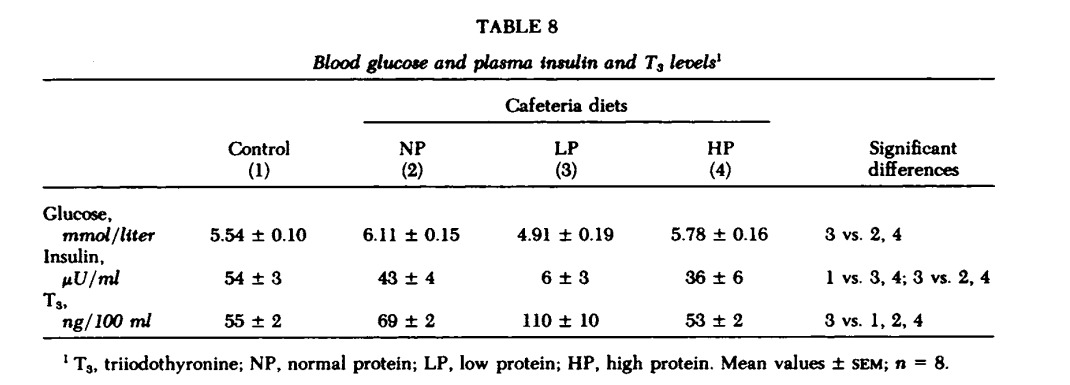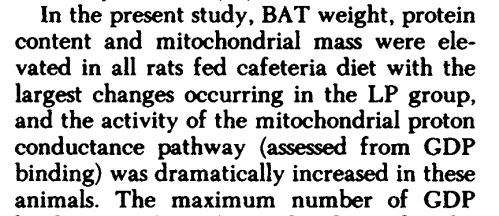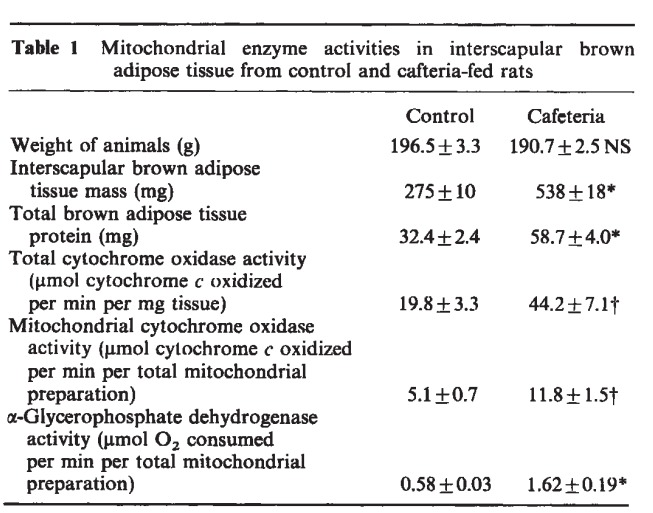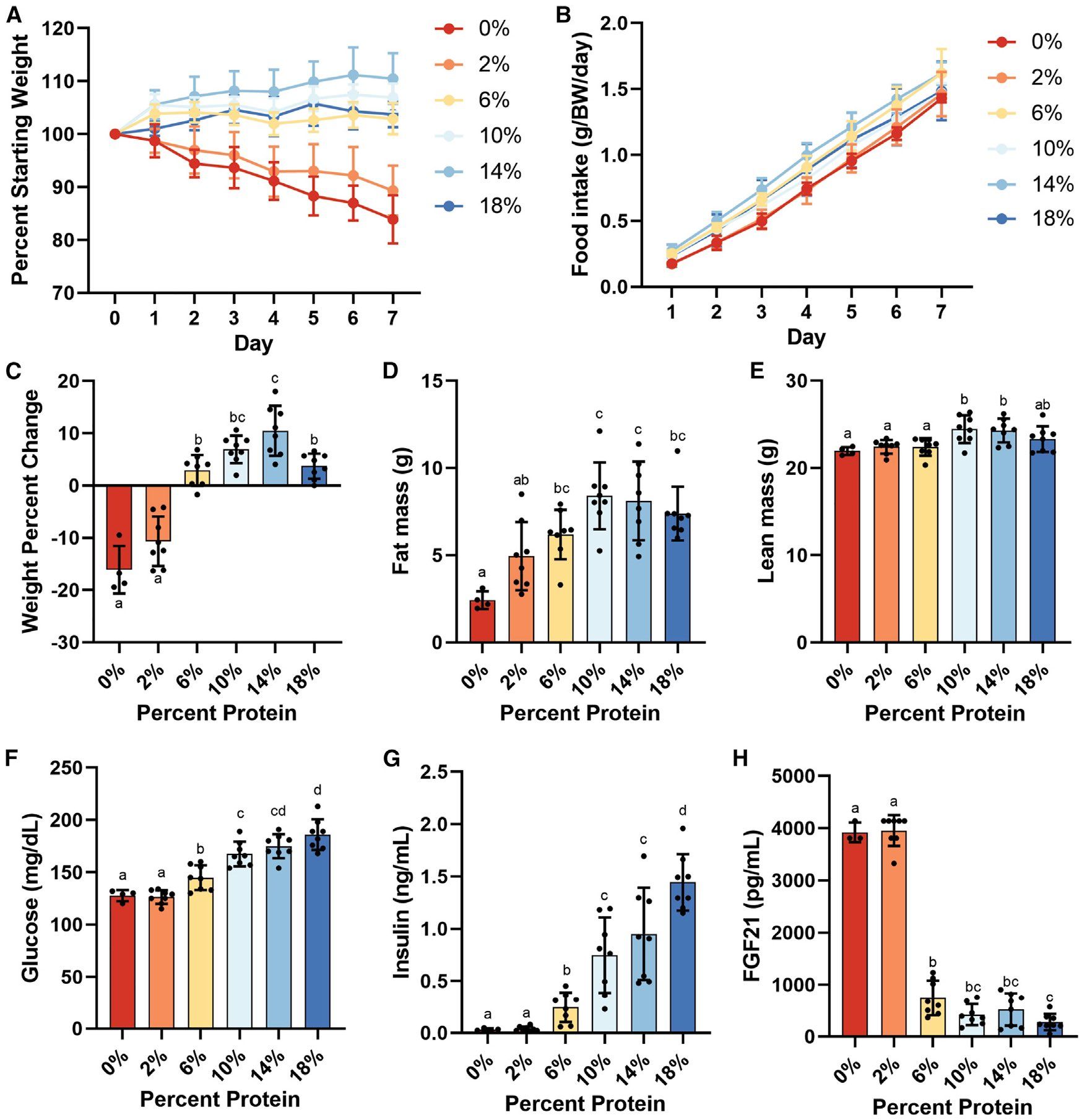Mice fed a 0% protein diet for a week lost nearly 20% of their body mass
-
It was not muscle mass either. Mostly fat. What is the mechanism behind this? Is it because of methionine and tryptophan restriction? Does the body break down fat tissue for protein when needed?
-
@Sugarnotsnow Very interesting, and I’m curious how safe this is over a period of time.
I’m not looking to lose any weight myself, but I do know that most people trying, regardless of the other macros, tend to never cut proteinSpeaking of macros, upon skimming the link the best I could, I didn’t see where they listed the mix for the rest of the diet, nor do I know enough about mouse feed to guess.
IIRC, Ray shifted favor towards a reduced protein intake in his later years. I do not know if that was what he felt was best for him personally or if it was a generally recommendation for the fully developed adult population.
-
@sphagnum Im not sure how safe itd be long term. You could take the @anabology approach where he avoids protein throughout the day to keep the metabolic rate high than has a protein based meal at dinner. I believe there arents many human studies showing benefits of extreme protein restriction, mostly aninal studies. Also, peat recommended lower protein for most adults as the metabolic rate begins to naturally decline at the age of 30. He clarified the 80-100g recommendation is for active young people who can burn up to 5k calories a day.
-
From a Peaty perspective, here are some quotes from Ray regarding low-protein diets:
"Vegetarians often notice temporary exhilaration when they stop eating meat, probably because their thyroid has been suppressed. But a more serious hypothyroid state often follows, from a low protein inadequate vegetarian diet. Low protein diets definitely interfere with the liver’s ability to detoxify estrogen and other stressors.”—Ray Peat
“A few years ago, most of the nutritional problems that I saw were caused by physicians, by refined convenience foods, and by poverty. Recently, most of the problems seem to be caused by badly designed vegetarian diets, or by acceptance of the idea that 40 grams of protein per day is sufficient. The liver and other organs deteriorate rapidly on low-protein diets. Observe the faces of the wheat-grass promoters, the millet-eaters, and the ‘anti-mucus’ dieters, and other low-protein people. Do they look old for their age?”—Ray Peat
"A simple protein deficiency has many surprising effects. It lowers body temperature, and suppresses the thyroid, but it increases inflammation and the tendency of blood to clot. Since the brain and heart and lungs require a continuous supply of essential amino acids if they are to continue functioning, in the absence of dietary protein, cortisol must be produced continuously to mobilize amino acids from the expendable tissues, which are mainly the skeletal muscles."—Ray Peat
-
@Jennifer Thank you for this! I wonder if his opinion on what he considered protein defficient changed from his early work to his later years. He said 40g was defficient but was eating around 50g later in life. Would 45-50g be sufficient?
-
@Sugarnotsnow, you’re welcome.
 Part of me questions if his opinion changed because he experienced benefits from reducing his protein intake the last year of his life. He said that it gave him energy, he was able to reduce his thyroid dose and his remaining allergies went away. However, he ended up having that nasty allergic reaction to veggies that affected his throat for months before his passing, and he had previously said that allergies are due to low thyroid function so did lowering his protein intake improve his thyroid function or actually worsen it as the experiment progressed?
Part of me questions if his opinion changed because he experienced benefits from reducing his protein intake the last year of his life. He said that it gave him energy, he was able to reduce his thyroid dose and his remaining allergies went away. However, he ended up having that nasty allergic reaction to veggies that affected his throat for months before his passing, and he had previously said that allergies are due to low thyroid function so did lowering his protein intake improve his thyroid function or actually worsen it as the experiment progressed?From my understanding, Ray’s low protein experiment lasted less than a year before he passed away so we’ll never know how he would have fared on it long-term. I only know how I fared on it so I can’t say with confidence that 45–50 g would be sufficient. I’ve been eating fruit-based since March of this year and as my protein intake decreased, my TSH increased. My most recent labs were done yesterday and it looks like my doctor will be putting me back on thyroid. I can’t say for certain my protein intake is the cause. All I know is, my prior diet was dairy-based and I averaged far more protein than I do now.
-
@Jennifer Hm thank you for sharing your experience. As you know from our conversations I also did not fare well on a low-protein fruitarian diet. However I feel like its unfair to blame it all on protein in my case. The diet was deficient in so many nutrients including fat solubles, zinc, selenium, B vitamins etc. I was able to completely reverse most the damage i did on that diet by eating lots of full fat dairy. Milk, cheese, and ice cream made up the majority of what i ate. I did put on some weight in this process but I was very underweight before then (105 lbs at my lowest) as a 5"10 adult male. Now im experimenting again with lower protein intake (55-60g) by replacing the milk/cheese with cream and having one protein based meal a day featuring yogurt and eggs. I feel good so far and have noticed no negative effects. My temps and pulse are quite stable as well. How are your temps now that you are trying lower protein?
-
@Sugarnotsnow, oh my. 105 at 5’10”? I’m so glad you changed course when you did. I can’t remember if you mentioned your caloric intake while on the fruitarian diet? I consumed so many calories that the only nutrients my diet was low in were protein and vitamin D. I sunbathed for D, but I still ended up deficient. My midday temp is lower now, but it’s still normal—98.6° fruit-based vs 99° dairy-based—however, my pulse dropped significantly—from an average of 85 while dairy-based to as low as 50 while fruit-based. It’s currently holding at 70. It wasn’t a conscious decision on my part to lower my protein intake. I lost my appetite a little over 2 months ago and the easiest things for me to get down have been nice cream and juice, but I’ve been forcing myself to have a meal of eggs in the evening just so that I get some animal protein and salt.
-
@Jennifer At first transitioning to fruitarian I was likely eating 2k calories or less which is how I lost so much weight. Towards the end of my vegan run however I attempted to see if I could gain weight back while remaining fruitarian. I was eating upwards of 10k calories of mostly fruit juice and still couldn't gain much weight. You can probably imagine how difficult it is to get that much calories of fruit alone. I feel like this is sort of proof that CICO isn't as simple as they make it seem. Maybe your loss in appetite was a sign that your thyroid health was already beginning to suffer? I know when I was at my lowest health and energy wise I also had very little appetite
-
@Sugarnotsnow, 10k calories of mostly juice must have been really expensive, huh? But yep, CICO isn’t as simple as they make it seem. Thyroid function alone will determine the rate of evaporation/metabolic rate. I do think my loss of appetite was a sign that my thyroid was beginning to suffer, since it happens every time.
-
@Jennifer Yea and a LOT of juicing
 I couldnt tolerate store bought juice so i was juicing multiple lbs of oranges, grapes, and melons every day just to get enough
I couldnt tolerate store bought juice so i was juicing multiple lbs of oranges, grapes, and melons every day just to get enough -
@Sugarnotsnow, yeah that! For my SIBO elimination diet, I juiced 14 lb of honeydew flesh daily with a Vitamix. I used a coffee filter to remove as much fiber as possible because it fed the overgrowth so it took me over 2 hours to juice. That was an expensive diet. For one day’s worth, the melon cost $30, a pound of scallops and crab cost $25, and along with a few miscellaneous foods like coconut oil, I was spending $400 a week on groceries.
-
@Jennifer Haha i can totally relate. I never had to manually filter the juice. But the juicing and peeling process itself took upwards of 2 hours as well. And two of my juicers broke from actively using them at hours on end every single day lol
-
@Sugarnotsnow, if only we had the Nama J2 back then.
-
Well considering he died…. I do think we know how he would fare on a low protein diet lol.
-
There are some studies saying that uncoupling protects the muscles, so I imagine it's something related. I think it's common knowledge that DNP seems to preserve a lot of muscle mass even if you lose a lot of weight (compared to fat loss with ozempic for example). When protein is restricted there is an increase in T3, uncoupling, brown fat... So this could be one of the reasons, but I don't know if it would preserve it for long
Low protein has twice as much t3



-
@TexugoDoMel Sugar also has a muscle and protein preserving effect. So if one were fed a high carb-low protein diet this could be a protective factor.
-
@Jennifer I still dont have one

-
@RawGoatMilk88 I doubt the low-protein experiment caused his death. If anything it couldve been an attempt to cure whatever health condition he was already dealing with which lead to his death.
-
Certainly didn’t help.
